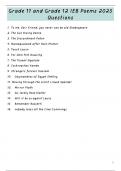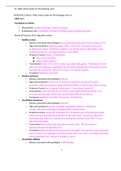Grade 11 and Grade 12 IEB Poems 2025
Questions
1. To me, fair friend, you never can be old Shakespeare
2. The Sun Rising Donne
3. The Discardment Paton
4. Namaqualand after Rain Plomer
5. Touch Lewin
6. For Oom Piet Dowling
7. The Tenant Ngulube
8. Cockroaches Yambo
9. Strangers forever Kassam
10. Ozymandias of Egypt Shelley
11. Moving through the silent crowd Spender
12. Mirror Plath
13. Go, lovely Rose Waller
14. Will it be so again? Lewis
15. Remember Rossetti
16. nobody loses all the time Cummings
1
, Sonnet 104
To me, fair friend, you can never be old – Shakespeare
To me, fair friend, you never can be old,
For as you were when first your eye I eyed,
Such seems your beauty still. Three winters cold
Have from the forests shook three summers’ pride,
Three beauteous springs to yellow autumn turned
In process of the seasons have I seen,
Three April perfumes in three hot Junes burned,
Since first I saw you fresh, which yet are green.
Ah, yet doth beauty, like a dial-hand,
Steal from his figure, and no pace perceived;
So your sweet hue, which methinks still doth stand,
Hath motion, and mine eye may be deceived:
For fear of which, hear this, thou age unbred, -
Ere you were born was beauty’s summer dead.
2
, Questions
1. What is the central theme of the poem "To me, fair friend, you never can be old"?
2. How does the speaker perceive the aging process in relation to the beauty of the
fair friend?
3. In what way does the speaker use the changing seasons to describe the passage
of time?
4. How does the imagery of "Three April perfumes in three hot Junes burned"
contribute to the overall meaning of the poem?
5. What role does the concept of beauty play in the speaker's perception of the fair
friend's agelessness?
6. How does the comparison of beauty to a "dial-hand" contribute to the speaker's
understanding of time and aging?
7. What is the significance of the line "Ere you were born was beauty’s summer
dead" in the context of the poem?
8. How does the speaker address the fear of deception in the perception of beauty
over time?
9. In what ways does the poem explore the timeless nature of the fair friend's
beauty?
10. How does the speaker use sensory imagery, such as sight and smell, to convey the
passing of time?
11. What is the role of seasons in shaping the narrative of the poem?
12. How does the speaker express the idea that beauty may deceive the observer?
13. What is the tone of the poem, and how does it contribute to the overall message?
14. How does the poem address the concept of mortality and aging?
15. Explore the use of metaphor in the line "Ah, yet doth beauty, like a dial-hand."
16. What emotions does the speaker convey through the language and imagery in the
poem?
17. How does the speaker address the fair friend directly in the poem?
18. What is the significance of the line "For fear of which, hear this, thou age
unbred"?
19. Discuss the role of repetition in the poem and its impact on the overall message.
3
, 20. How does the structure of the poem contribute to the exploration of the theme
of eternal beauty?
The sun rising - John Donne
Busy old fool, unruly Sun,
Why dost thou thus,
Through windows and through curtains call on us?
Must to thy motions lovers' seasons run?
Saucy pedantic wretch, go chide
Late school-boys, and sour 'prentices,
Go tell court-huntsmen that the King will ride,
Call country ants to harvest offices;
Love, all alike, no season knows, nor clime,
Nor hours, days, months, which are the rags of time.
Thy beams, so reverend and strong
Why shouldst thou think?
I could eclipse and cloud them with a wink,
But that I would not lose her sight so long:
If her eyes have not blinded thine,
Look, and tomorrow late tell me,
Whether both the Indias of spice and mine
Be where thou left'st them, or lie here with me.
Ask for those kings whom thou saw'st yesterday,
And thou shalt hear, 'All here in one bed lay."
She's all States, and all Princes I;
Nothing else is.
Princes do but play us; compared to this,
All honour's mimic; all wealth alchemy.
Thou, Sun, art half as happy as we,
In that the world's contracted thus;
Thine age asks ease, and since thy duties be
To warm the world, that's done in warming us.
Shine here to us, and thou art everywhere;
This bed thy centre is, these walls thy sphere.
4







